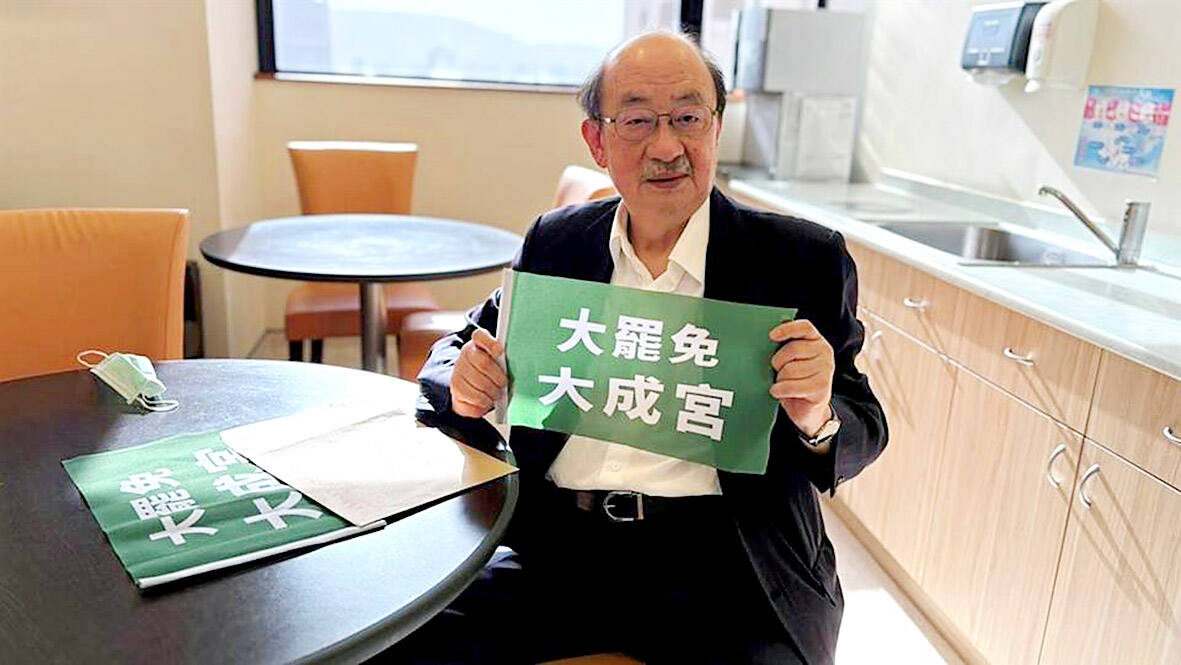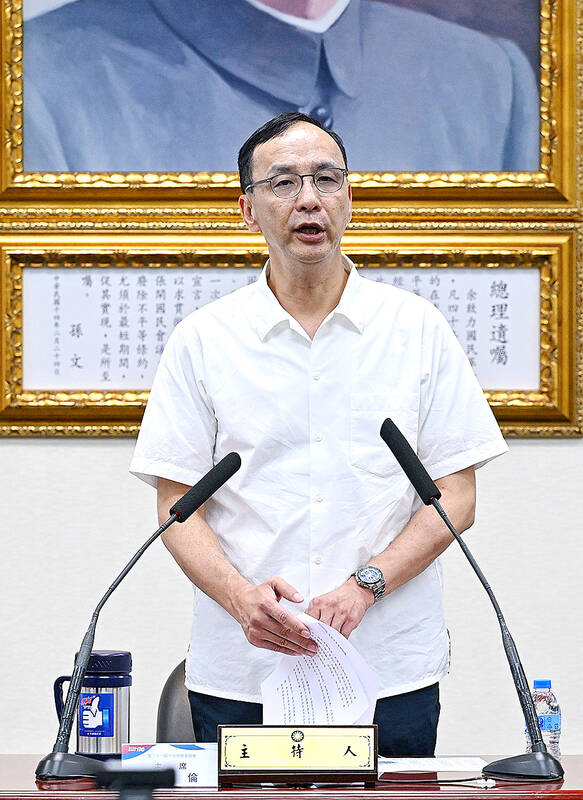The unexpected collapse of the recall campaigns is being viewed through many lenses, most of them skewed and self-absorbed.
The international media unsurprisingly focuses on what they perceive as the message that Taiwanese voters were sending in the failure of the mass recall, especially to China, the US and to friendly Western nations.
This made some sense prior to early last month. One of the main arguments used by recall campaigners for recalling Chinese Nationalist Party (KMT) lawmakers was that they were too pro-China, and by extension not to be trusted with defending the nation.

Photo: George Tsorng, Taipei Times
Also by extension, that argument could be interpreted as being pro-US. Though it would be a mistake to label the KMT as a whole “anti-American,” those that are more suspicious of the US do overwhelmingly support the KMT.
The Chinese Communist Party (CCP) had a field day with the results and gleefully spun it to suit their agenda. As CCP mouthpiece Global Times put it: “the world has seen clearly that ‘Taiwan independence’ is a dead end, and the historical trend of the motherland’s inevitable reunification is mighty, and [President William] Lai (賴清德) and his ilk are being buried by public opinion and the times.”
The US government wisely kept its opinions to itself, but no doubt many in Washington are viewing this as a defeat.

Photo: TT file photo
Leaders in Beijing and Washington need to get over themselves, in the end it was not about you.
SUSPICIOUS SWING VOTERS
Data collected in late June and the beginning of last month pointed to some recalls being successful. It was likely a fairly accurate picture at the time, and even the KMT expected to lose seats.

Photo taken from the Internet
Yet, the results showed that in the last few weeks before the vote there was a big surge opposing the recalls. When the results came in, the KMT crowed victory, the Democratic Progressive Party (DPP) was cowed and illegal bookies faced a bloodbath.
In reality both the KMT and DPP were cowed, and illegal bookies picked the wrong profession.
The recall campaigns — despite KMT claims they were orchestrated by President Lai and the DPP — were an outgrowth of the Bluebird Movement working with friendly civil society groups.

Photo: Chang Chia-ming, Taipei Times
They were grassroots initiatives, and wisely Lai and the DPP initially kept their distance, though some DPP individuals showed support and the party held rallies and activities indirectly supporting the recall campaigns. As a party, they kept themselves at an arm’s length.
The KMT attempted to organize their own recall campaigns against DPP lawmakers. Their top-down, party-organized campaigns quickly collapsed, lacking grassroots support.
As we explored in “The real winner in the recalls” (July 29, page 12), Lai made the mistake of ordering the party to actively support the recalls at the end of June at the DPP party congress.
Despite what the KMT claims otherwise, the DPP did not take control of the recall movement, but they did send out a flood of their personnel and aided with logistics.
It is easy for voters to sympathize with the amateur grassroots organizers from the neighborhood, but far less so when they gain professional logistical support and are backed by DPP party operatives.
That was what changed in the weeks prior to the recall votes, the overt support by the DPP turned it into a partisan battle, which is precisely what the KMT had been trying to portray it as.
In the aftermath of the recalls, the DPP’s response has been confused, pointing to the recalls as independent of the party as if the failure was not their fault, while Lai personally apologized and “accepts full responsibility” for the results.
A significant segment of the electorate does not particularly like either party. Individual reasons for coming to that conclusion vary, but they are the voters who swing elections.
Another group of voters might lean towards one party or another if their choice is limited, but are willing to respond to alternatives, especially grassroots-led ones.
Widespread support for the 2014 Sunflower movement, sparked by a KMT-proposed trade pact with China, and the two elections of Ko Wen-je (柯文哲) as independent mayor of Taipei came from those swing voters looking for alternatives.
They are also the voters who produced the landslide victories for Ma Ying-jeou (馬英九) in 2008 and Tsai Ing-wen (蔡英文) in 2016 and 2020. They are a force to be reckoned with.
For international readers, the outcome does not indicate that voters are any more interested in being annexed by the CCP or are suddenly rejecting American support.
The voters rejected the KMT’s recall attempts outright, and the DPP’s support of the recalls at the last minute blew up in their face.
The result was loud and clear that swing voters distrust being treated as pawns by the big political parties. They chose to preserve the outcome of the last year’s elections, which entrusted the executive branch to the DPP and the legislature to the KMT and their allies in the Taiwan People’s Party (TPP).
WILL THEY LEARN?
In theory, both parties could learn and grow from this experience.
The KMT now have an opportunity to reach out to swing voters. That they were on track to lose seats until the DPP made the mistake of helping them by getting involved should serve as a warning.
They could stop calling Lai a “dictator” and likening him to Hitler. The recall results showed definitively that Taiwan is not an authoritarian state.
If they were serious when campaigning about defending Taiwan and that they can be trusted to engage in dialogue with China, they could push for increasing defense spending to 3.5 percent of GDP, as party Chairman Eric Chu (朱立倫) promised on July 2. They could also be more transparent in their dealings with Chinese officials, and take a firmer stance on Taiwan (or Republic of China) sovereignty.
To solve the constitutional crisis they created on the Constitutional Court, they could support entering negotiations with the DPP to find mutually acceptable non-partisan professionals to fill the seven open seats, and the DPP should respond in kind. The two sides were able to push through constitutional changes during the contentious Chen Shui-bian (陳水扁) presidency, so theoretically they can manage this.
The KMT could consider new legislative leadership, not ex-convict Fu Kun-chi (傅崐萁). He is unpopular, arrogant, offensive, stubborn and has too many ties to China.
The DPP could swallow their pride and accept that many voters are suspicious of it, and consider the reasons why. Some suspicions are not easily resolved for historical and ideological reasons, but other reasons are practical and solvable — such as not packing the government with figures from the New Tide faction.
The DPP could also recognize that its days as a grassroots party are long over, despite what many idealists in the party may continue to flatter themselves as representing. They are an effective political machine now, and voters view them as such.
They could also keep grassroots civil society organizations at a distance so they can develop and grow independently.
The DPP might also consider new leadership in the legislature. Ker Chien-ming (柯建銘) is unpopular, arrogant, offensive, stubborn and has a reputation for being a dinosaur backroom wheeler-dealer.
When Sunflower movement leaders were asked why they did not ally with the DPP, they said they distrusted the party and pointed to Ker as emblematic of why.
Will the parties learn and grow from this experience?
Probably not, which is why so many voters are cynical about both parties.
The DPP has planned their primaries for next year’s local elections for later this year, and the KMT’s chair election is coming up in October.
Both parties have deep structural problems, and now would be a good time to examine them as they gear up for next year’s elections.
Donovan’s Deep Dives is a regular column by Courtney Donovan Smith (石東文) who writes in-depth analysis on everything about Taiwan’s political scene and geopolitics. Donovan is also the central Taiwan correspondent at ICRT FM100 Radio News, co-publisher of Compass Magazine, co-founder Taiwan Report (report.tw) and former chair of the Taichung American Chamber of Commerce. Follow him on X: @donovan_smith.

This is the year that the demographic crisis will begin to impact people’s lives. This will create pressures on treatment and hiring of foreigners. Regardless of whatever technological breakthroughs happen, the real value will come from digesting and productively applying existing technologies in new and creative ways. INTRODUCING BASIC SERVICES BREAKDOWNS At some point soon, we will begin to witness a breakdown in basic services. Initially, it will be limited and sporadic, but the frequency and newsworthiness of the incidents will only continue to accelerate dramatically in the coming years. Here in central Taiwan, many basic services are severely understaffed, and

Jan. 5 to Jan. 11 Of the more than 3,000km of sugar railway that once criss-crossed central and southern Taiwan, just 16.1km remain in operation today. By the time Dafydd Fell began photographing the network in earnest in 1994, it was already well past its heyday. The system had been significantly cut back, leaving behind abandoned stations, rusting rolling stock and crumbling facilities. This reduction continued during the five years of his documentation, adding urgency to his task. As passenger services had already ceased by then, Fell had to wait for the sugarcane harvest season each year, which typically ran from

It is a soulful folk song, filled with feeling and history: A love-stricken young man tells God about his hopes and dreams of happiness. Generations of Uighurs, the Turkic ethnic minority in China’s Xinjiang region, have played it at parties and weddings. But today, if they download it, play it or share it online, they risk ending up in prison. Besh pede, a popular Uighur folk ballad, is among dozens of Uighur-language songs that have been deemed “problematic” by Xinjiang authorities, according to a recording of a meeting held by police and other local officials in the historic city of Kashgar in

It’s a good thing that 2025 is over. Yes, I fully expect we will look back on the year with nostalgia, once we have experienced this year and 2027. Traditionally at New Years much discourse is devoted to discussing what happened the previous year. Let’s have a look at what didn’t happen. Many bad things did not happen. The People’s Republic of China (PRC) did not attack Taiwan. We didn’t have a massive, destructive earthquake or drought. We didn’t have a major human pandemic. No widespread unemployment or other destructive social events. Nothing serious was done about Taiwan’s swelling birth rate catastrophe.